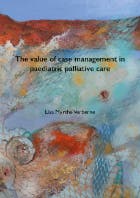Lisa Verberne
The value of case management in paediatric palliative care.

- Datum
- (Co) promotoren
- 31-08-2017
- prof.dr. J.J.M. van Delden, prof.dr. M.A. Grootenhuis, dr. M.C. Kars, dr. D.K. Bosman
Samenvatting
In the Netherlands around 4000 – 6700 children with life-limiting diseases could benefit from paediatric palliative care (PPC). However, adequate PPC is often absent due to the lack of continuity and coordination of care and limited expertise among healthcare professionals (HCP). Consequently, many parents feel alone with managing the care for their ill child at home. In response to the shortcomings in PPC, in 2012 the first Dutch paediatric palliative care team was initiated as a three-year pilot project at the Emma Children’s Hospital in Amsterdam; the ‘Emma Thuis team’ (ETt). This transmural multidisciplinary team aims to bridge the gap between home and hospital and is responsible for the quality, continuity and coordination of PPC. We evaluated the value of the ETt with an interpretative qualitative interview study among 42 parents of 24 children with life-limiting diseases and 35 HCPs and an additional cross-sectional study among 71 HCPs. From the lived experience of parents, we identified that parents strived for three aims: controlled symptoms and controlled disease, a life worth living for their child and a family balance. To achieve the three aims, parents performed four groups of tasks: providing basic and complex care, organising good quality care and treatment, making sound decisions while managing risks and organising a good family life. To manage these tasks and their worries, parents used emotion- and problem-oriented coping strategies. Particularly facing up to their child’s premature end-of-life and continuously fearing the loss of their child was something parents could not maintain. This led to emotional disruption, interfering with their parenting role. By keeping the end-of-life ‘out of mind’ and by suppressing their associated emotions, parents were able to live up to their parental role, keep life going and to use the here-and-now to enjoy life with their child(ren). Parents noted that the ETt provided them important support. They felt relieved by their practical support, streamlining of sticky procedures, low-threshold consultation access and family-centered approach. Parents experienced that expertise was always available for questions about major and minor problems and decisions. From the HCPs’ perspective, it became clear that once they experienced in practice how the ETt improved PPC and was of meaning to the families, they positively valued the team. The added value, such as more focus on transferring knowledge, on being proactive, on continuity and coordination of care and on increasing expertise in PPC, only became clear to involved HCPs during collaborations with the ETt. Regarding anticipating future care, different thoughts about future care and treatment occurred in parents and HCPs but were not always shared among them. HCPs mainly addressed advance directives and the preferred place of death. Parents addressed a good life for their child and the prevention of suffering. Overall, we conclude that case management, as provided by the ETt, is of added value in PPC. Furthermore, the ETt now has ample room to further enhance the actual content of PPC. This can be done by giving further shape to promising developments in PPC, such as advance care planning.
